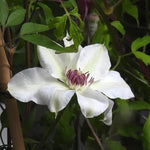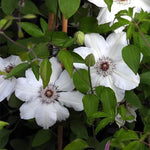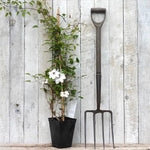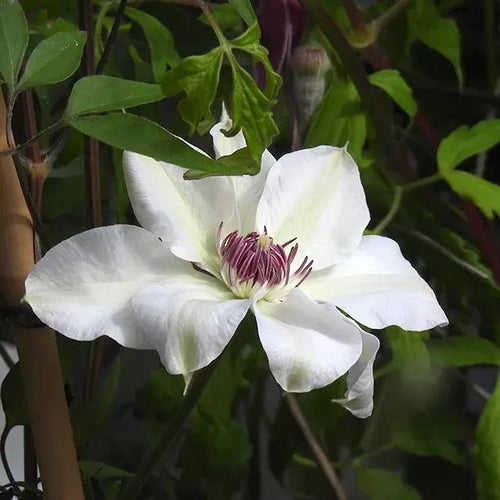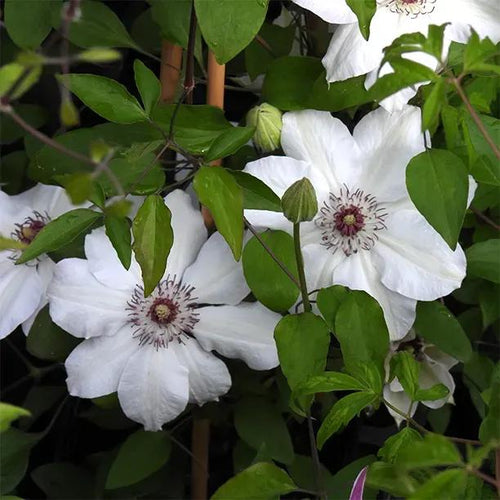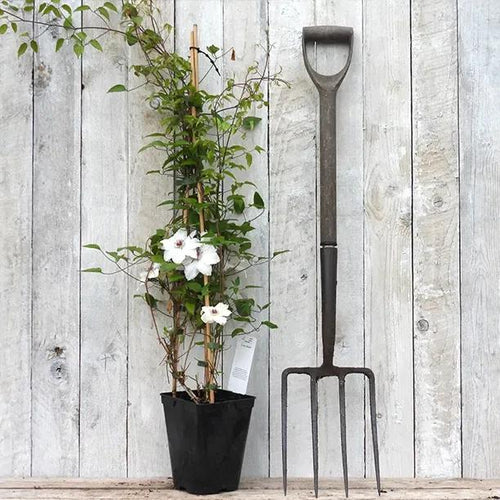 Which Best Plant Supplier 2025
Which Best Plant Supplier 2025 Delivered across the UK
Delivered across the UK Platinum Trusted Service Award
Platinum Trusted Service Award
About This Product
Miss Bateman Clematis Plants
Miss Bateman is a stunning late-spring flowering clematis. Her large white open flowers are decorated with a soft green stripe from base to tip, while the large central button is resplendent with rich claret-red anthers. She's vigorous and reliable, growing to around 2.5m in height and about 1m in spread, suitable for most gardens.
The first flowering comes in May or June, and in most years you'll get a repeat performance in late summer or early autumn: great value for your money!
Take a look at the rest of our clematis range.
Features
- Pruning group: 2
- Colour: White with a pale green stripe
- Height: 2.5m
- Scent: none
- Flowering: May to June, repeating August to September
- Size: 15cm
- Often flowers twice a year
- Type: Early Large-flowered
Growing Miss Bateman Clematis
You'll need something for her to climb over, and decent moisture-retentive soil. Given that, a good show of flowers should be within your grasp if you plant either in sun or part shade, close to a large shrub, alongside an apple tree or by an arbour or archway. You can also grow her in a large pot of multipurpose compost.
As with all clematis, she likes her root area to be in full shade, which helps the plant to keep cool in hot weather.
She's in pruning group 2, so you prune her in late winter.
Garden Design Ideas
The fabulous combinations of colour and form that can be achieved with clematis are pretty much endless, but let's start with roses. A large sturdy rose such as golden Belle de Jour or butter-yellow Graham Thomas makes the perfect host (plant the clematis to the shady, north side of the shrub, and it'll clamber through toward the sun), the yellow of the rose bringing out the yellow of Miss B's central stamen.
Trained through a ceanothus, the white clematis blooms shine against the glossy dark foliage and fluffy blue pompoms of the shrub.
A wisteria contrasts wonderfully, its long, dripping lilac racemes sporting broaches of simple, open clematis flowers.
Grown over a fence in a sunny border, try underplanting with a moody wine coloured bearded iris such as Sultan's Palace, Superstition or Black Knight.
History & Trivia
Bred by Charles Noble in 1869 from Fortunei and Standishii, she is named after Katherine, the daughter of Noble's friend and orchid breeder, James Bateman, who greatly developed the themed gardens at Biddulph Grange, which are one of the few remaining stately home British gardens from before the Victorian period that weren't designed by, or in the style of, Capability Brown.












 Secure, One-Tap Checkout
Secure, One-Tap Checkout
 Hand Picked, Delivered to Your Door!
Hand Picked, Delivered to Your Door! 1 Year Bareroot Guarantee
1 Year Bareroot Guarantee